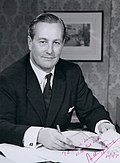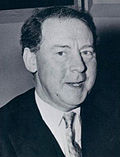| | |||||||||||||
| |||||||||||||
| |||||||||||||
| |||||||||||||
The 1961 Labour Party leadership election was held when, for the second year in succession, the incumbent leader was challenged for re-election. Normally the annual re-election of the leader had been a formality.
Contents
The challenge followed factional in-fighting over issues like nuclear disarmament. The leader favoured the retention of nuclear weapons by the UK, whereas the left wing of the party supported the Campaign for Nuclear Disarmament.


